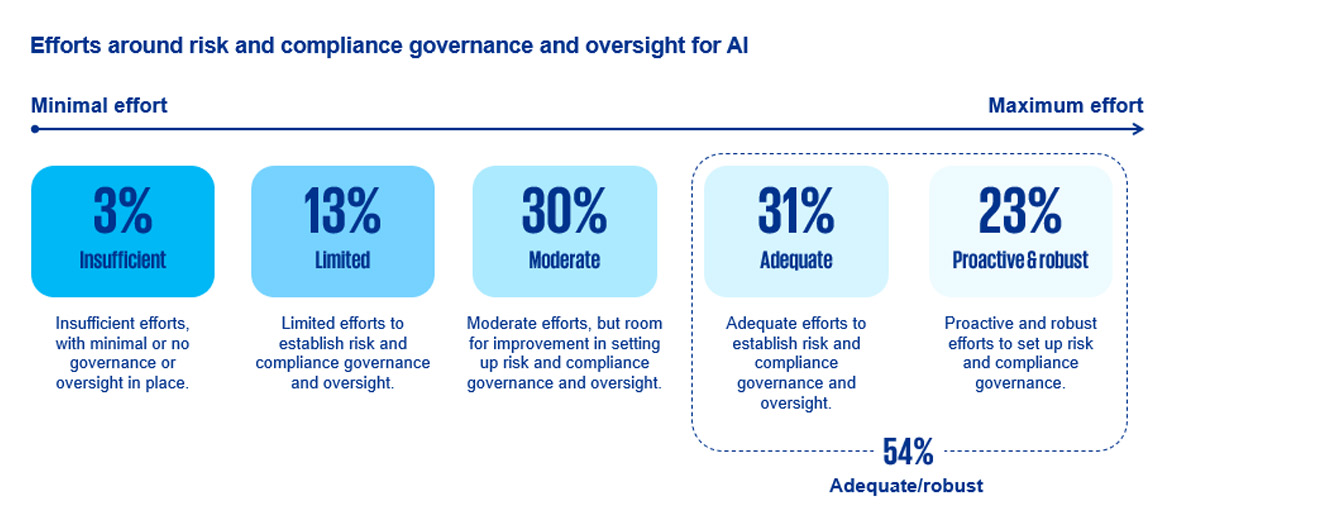Footnotes
- Disruption Decoded: Private company survey results, KPMG LLP, 2024.
- Ibid.
- Ibid.
- Ibid.
Tech advances like AI are reshaping businesses. Our survey of 600 private company CEOs shows its impact on operations and growth.

Technological advancements, particularly generative artificial intelligence (AI), promise to revolutionize business operations. And private-company chief executive officers (CEOs) and leaders recognize the opportunity. So we surveyed more than 600 private-company CEOs to see how this disruptive technology is impacting their business and long-term growth prospects. This edition of Privately Speaking explores the results of that survey.
Who did we survey?
We talked to more than 600 leaders of US-based businesses. A third were “Emerging Giants” planning to go public in the next five years. A third were “Traditional Private” companies with more than $100 million in revenue but no intentions to go public. The final third was made up of ”Recent IPOs”—companies that went public in the last three years and have more than $100 million in annual revenue.
Private company CEOs recognize that AI is rapidly changing their industry and business environment. In fact, in our survey, 75 percent of CEOs say AI will be relevant or extremely relevant to their sector within the next three years. Interestingly, just half suggest it will have the same relevance in the short term, suggesting that generative AI application is just getting started.1

Source: Disruption Decoded: Private company survey results, KPMG LLP, 2024.
Yet, respondents are split regarding its role as a leveler or as a game changer with 47 percent saying AI is leveling the playing field, and 53 percent saying it is more of a game changer for innovators and disruptors (it is likely no coincidence that 53 percent also say they are eager disruptors themselves—see our previous edition of Privately Speaking for more on that).2
Compared to other technologies, nearly half of private company leaders say they rank AI as one of the top three technologies for enabling business growth and investment in their sector, and far more respondents ranked AI first among technologies in terms of that enabling capability.
Generally speaking, private company CEOs seem to believe that the opportunities of AI outweigh the risks. But there are clear differences depending on what type of private company you lead.
48%
Do you have the data?
Nearly half of our survey respondents say that data management and infrastructure are the biggest areas of challenge they expect to deal with as they look to take advantage of AI opportunities.
1
2
3
Where are private company leaders expecting to get the best bang for their AI buck? Customer relationship management is where most expect AI to play a key role for their business, but nearly the same number expect AI to be very important to all other business functions in both the short term and the long term.
Surprisingly, only around 57 percent believe AI will play a major role in fraud detection and cybersecurity, considering the perceived importance of cybersecurity risk.3 The development of AI can be seen not only as a tool for combating fraud and cyberattacks but also a potential cybersecurity threat as malicious individuals can use AI to compromise systems.
Companies recognize that the transformative potential of AI will unfold gradually as they overcome technical challenges, regulatory hurdles, and the need to attract and retain talent. This suggests companies have realistic expectations as they continue to invest in AI initiatives and governance.
Conor Moore
Global Head, KPMG Private Enterprise
Our survey suggests that private market companies are preparing to manage AI risk, but they still have work to do. Indeed, over half of the companies surveyed say they have implemented at least adequate AI risk and compliance oversight, but just under a quarter (23 percent) say their risk compliance efforts are proactive and robust.4

Source: Disruption Decoded: Private company survey results, KPMG LLP, 2024.
In response, our survey indicates that private market leaders are focusing on a range of activities to address AI risk mitigation, including training programs, establishing internal teams to oversee risk management, and collaborating with experts and consultants.
Companies are divided on the role of AI, and there are challenges that need to be addressed to realize its benefits. The bottom line is that companies need to be proactive in addressing the challenges and risks associated with disruption in order to capitalize on growth opportunities.
Francois Chadwick
Partner, Tax, KPMG Private Enterprise
Do you want to learn more? Get the full survey results in Disruption Decoded, a new report from KPMG Private Enterprise.

Disruption Decoded: Private company survey results
Perspectives on growth, AI, and reporting from private and newly-public companies.

Generative AI
Reinvent your business with our GenAI solutions. Achieve greater value, drive innovation, and unlock new potential.

Privately Speaking Series
Practical insights for private market leaders from private company advisors.
Subscribe to receive pertinent information that will help you drive value for your private company.
